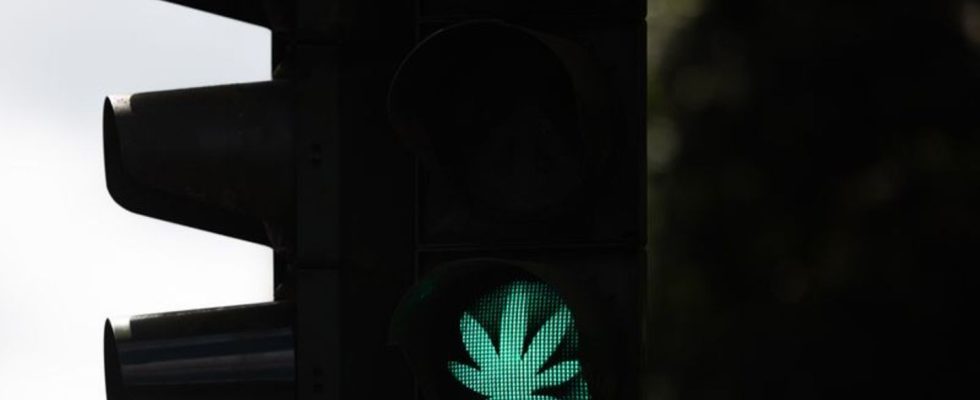The Traffic Light Coalition is pushing for limited legalization of cannabis for adults. After many arguments, the time has come: Parliament now has the floor.
The Bundestag is deciding today on the partial legalization of cannabis in Germany. The traffic light coalition’s legal plans provide for controlled release with numerous specifications and rules.
Cultivation and possession of certain quantities for personal consumption should therefore be permitted for adults from April 1st. Clubs for non-commercial cultivation should be possible on July 1st. The far-reaching turning point in drug policy remains controversial until the very end. Federal Health Minister Karl Lauterbach (SPD) expressed confidence that the law will be passed. It would then come before the Federal Council on March 22nd, but it does not require approval.
The MPs should vote on the cannabis release by roll call. Some parliamentarians from the ranks of the co-ruling SPD had made their objections clear in advance. However, support from the ranks of the Left and the Sahra Wagenknecht Alliance is also considered likely. In a vote in the leading health committee, the SPD, Greens and FDP as well as the two groups also voted in favor. The Union and the AfD have positioned themselves against the project and are also calling for a stop in their applications.
What should be allowed
Adults aged 18 and over should generally be allowed to possess up to 25 grams of cannabis for personal consumption. Three live cannabis plants should become legal in your own home and up to 50 grams of cannabis for personal consumption. Public consumption should be banned, among other things, in schools, sports facilities and within sight of them – specifically within 100 meters of the entrance area as the crow flies.
“Growing associations” for adults should also be permitted, in which up to 500 members who live in Germany grow cannabis together and sell it to each other for their own consumption – a maximum of 50 grams per member per month. No later than 18 months after the law comes into force, an initial assessment should be available on, among other things, how it affects the protection of children and young people.
Traffic light politicians defend plans
The federal government’s drug commissioner, Burkhard Blienert, spoke of a new drug and addiction policy, “away from stigmatization and criminalization, towards more protection and help.” The SPD politician told the editorial network Germany (RND) that the main points were better health protection for people who wanted to consume cannabis over the age of 18, a push back on the black market and better prevention. “I am convinced that anyone who is allowed to grow hemp themselves will no longer buy dangerous mixtures from dealers on the black market.”
Interior Minister Nancy Faeser (SPD) told the Bavaria media group that the current situation was unacceptable. “We all know that there are problems with dangerous toxic mixtures on the black market. More control is needed here.” At the same time, more capacity is needed to combat organized drug crime.
Lauterbach: Control effort is not an argument against releasing cannabis
Federal Health Minister Karl Lauterbach (SPD) sees the possible control effort as no argument against the planned partial legalization of cannabis in Germany. “We have a certain level of control effort there, but it is within limits and I think that will settle in quickly,” Lauterbach told broadcaster Phoenix.
“The same argument was used back then against the requirement to wear seat belts.” At that time too, it was explained that the control effort required to wear seat belts in vehicles was far too high. “Whenever an important, major law comes, we always have a control task, especially at the beginning.”
Union criticizes and wants rules for road traffic
The Union sticks to its line that partial legalization is a mistake. “Studies show the sharp increase in cannabis consumption and increased dependence after legalization,” said CSU General Secretary Martin Huber to the Funke media group. The traffic lights not only endanger the health of millions of teenagers and young adults, the judiciary and authorities warned of an immense administrative burden. “A health minister who legalizes drugs is completely wrong in his job.”
Meanwhile, Bavaria is continuing to examine the possibility of filing a lawsuit against the law, as State Health Minister Judith Gerlach (CSU) said. “Bavaria is determined to take a stand against the dangerous consumption of cannabis should the law come into force,” she told the Germany editorial network.
The CDU transport politician Florian Müller demanded in the “Rheinische Post” that further regulations should focus on road safety and the protection of children and young people. “Smoking weed has no place behind the wheel.” Transport Minister Volker Wissing (FDP) must ensure this.” Wissing’s house is currently having a group of experts determine how a legal limit for the intoxicating active ingredient THC could be set. The results should be available in the spring.
The professional association of pediatricians and adolescent doctors also reported concerns. “We fear that cannabis will increasingly be passed on to children and young people if the substance is legalized for adults,” said President Michael Hubmann of the “Ärzte Zeitung”.
Survey: 47 percent for cannabis legalization
According to a survey, citizens are divided on the issue of cannabis legalization. In a survey by the polling institute YouGov, 47 percent said they were somewhat or completely in favor of legalization. 42 percent said they would somewhat or completely reject it. 11 percent did not comment on this, as can be seen from the survey that was available to the German Press Agency.

